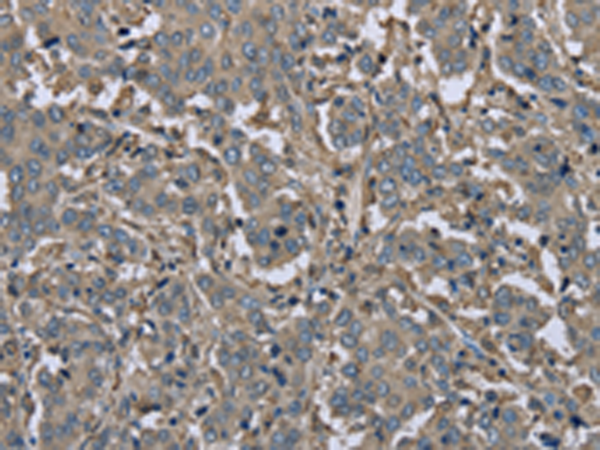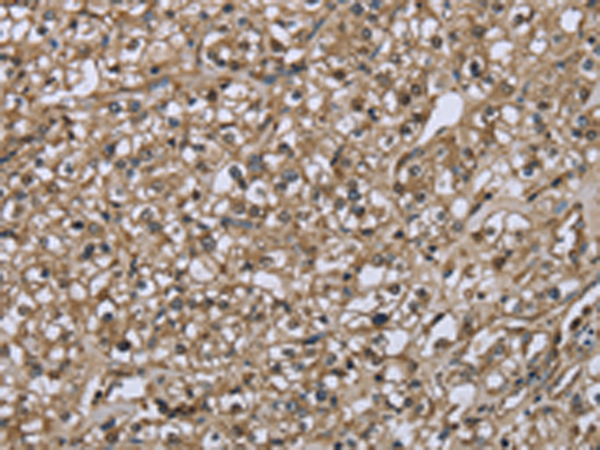


| WB | 咨询技术 | Human,Mouse,Rat |
| IF | 咨询技术 | Human,Mouse,Rat |
| IHC | 1/50-1/200 | Human,Mouse,Rat |
| ICC | 技术咨询 | Human,Mouse,Rat |
| FCM | 咨询技术 | Human,Mouse,Rat |
| Elisa | 1/2000-1/5000 | Human,Mouse,Rat |
| Aliases | FBP |
| WB Predicted band size | 37 kDa |
| Host/Isotype | Rabbit IgG |
| Antibody Type | Primary antibody |
| Storage | Store at 4°C short term. Aliquot and store at -20°C long term. Avoid freeze/thaw cycles. |
| Species Reactivity | Human, Mouse |
| Immunogen | Fusion protein of human FBP1 |
| Formulation | Purified antibody in PBS with 0.05% sodium azide and 50% glycerol. |
+ +
以下是关于FBP1抗体的3篇模拟参考文献(信息为示例,实际文献需通过学术数据库验证):
---
1. **文献名称**: *FBP1 loss disrupts liver metabolism and promotes tumorigenesis through epigenetic and metabolic reprogramming*
**作者**: Li B, et al.
**摘要**: 研究通过FBP1特异性抗体检测肝癌组织中FBP1蛋白表达,发现FBP1缺失通过抑制糖异生、激活HIF-1α信号通路促进肿瘤生长,提示其作为代谢检查点的抑癌作用。
---
2. **文献名称**: *FBP1 deficiency in renal cell carcinoma contributes to tumor immune evasion by impairing dendritic cell function*
**作者**: Hirata E, et al.
**摘要**: 利用FBP1抗体进行免疫组化分析,发现肾癌中FBP1低表达与树突状细胞功能受损相关,表明FBP1通过调控肿瘤微环境代谢影响免疫治疗响应。
---
3. **文献名称**: *FBP1 suppression links mitochondrial dysfunction to HER2-driven breast cancer aggressiveness*
**作者**: Deng Y, et al.
**摘要**: 通过Western blot和免疫荧光(使用FBP1抗体)证实,HER2阳性乳腺癌中FBP1表达下调导致线粒体氧化代谢受损,进而促进肿瘤侵袭转移。
---
**建议**:通过PubMed或Google Scholar搜索“FBP1 antibody”或“FBP1 cancer metabolism”可获取真实文献。关注近年研究(如2020年后)可能更具时效性。
The fructose-1.6-bisphosphatase 1 (FBP1) antibody is a critical tool for studying the role of FBP1. a rate-limiting enzyme in gluconeogenesis that catalyzes the hydrolysis of fructose-1.6-bisphosphate to fructose-6-phosphate. Primarily expressed in the liver and kidneys, FBP1 regulates glucose homeostasis by counterbalancing glycolytic pathways. Research interest in FBP1 has expanded due to its emerging roles beyond metabolism, including tumor suppression. Studies reveal that FBP1 downregulation or loss is linked to cancers like hepatocellular carcinoma and renal cell carcinoma, where its absence correlates with enhanced glycolysis (Warburg effect), proliferation, and metastasis. However, FBP1 exhibits context-dependent roles in cancer, acting as both a tumor suppressor and a potential promoter in specific contexts.
FBP1 antibodies are widely used in techniques such as Western blotting, immunohistochemistry, and immunofluorescence to quantify protein expression, assess tissue localization, and explore molecular mechanisms in metabolic disorders (e.g., diabetes) and cancer. These antibodies must distinguish FBP1 from its isoform FBP2. which shares structural homology but has distinct tissue _expression (e.g., muscle). Validated FBP1 antibodies aid in clarifying its dual metabolic and non-metabolic functions, offering insights into disease pathways and therapeutic targeting. Recent studies also investigate FBP1's interplay with signaling pathways (e.g., mTOR, HIF), emphasizing its relevance in hypoxia responses and metabolic reprogramming.
×